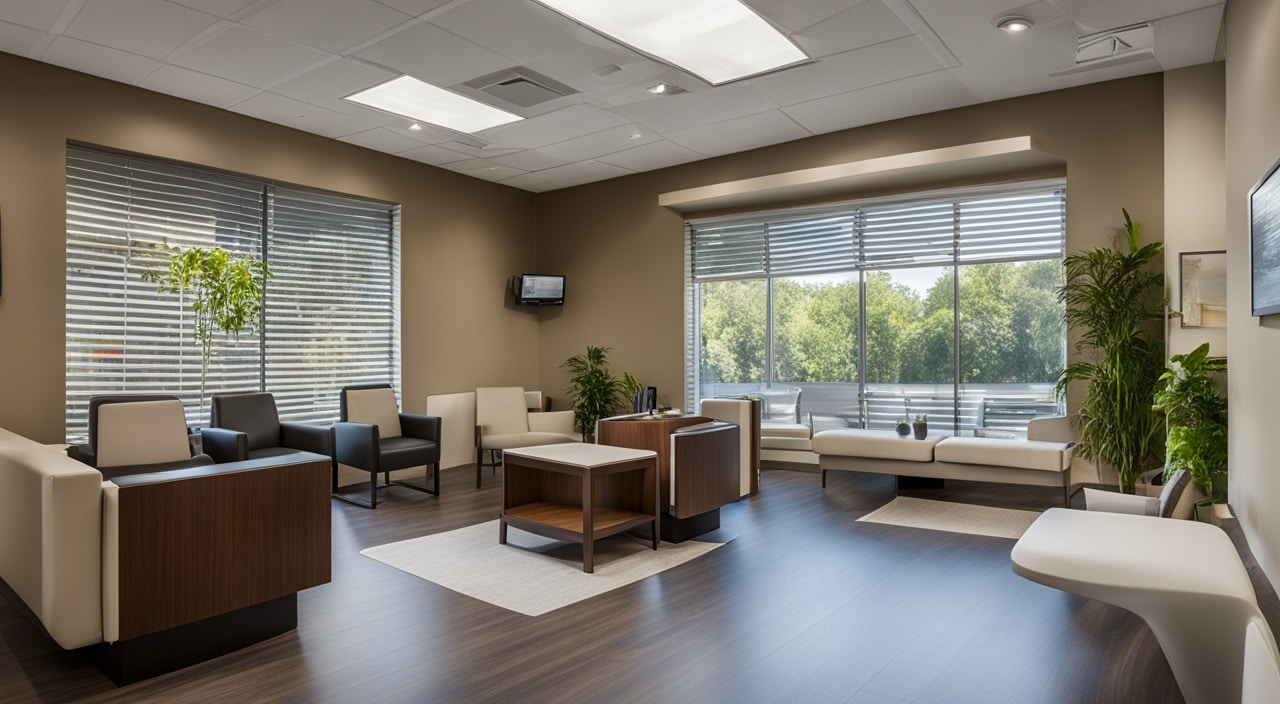Hospitals and medical clinics provide healthcare, but they are different in some ways. Hospitals offer a wide range of services for various medical issues. They have specialists in internal medicine, pediatrics, or family practice. They can handle complex issues and serious injuries. On the flip side, medical clinics tend to be smaller and focus more on primary care and preventing illnesses than a regular doctor’s office.
It’s crucial to know how medical clinics and hospitals vary. This knowledge helps patients choose the right care for them. Whether you need check-ups, managing a long-term condition, or quick medical help, knowing the difference can guide you. It enables you to make smart choices about your medical care.
Key Takeaways
- Hospitals offer a broad range of medical services, including care for complex issues and emergencies, while clinics focus on primary care and preventive services.
- Clinics are typically smaller in size and have a narrower scope of services compared to hospitals.
- Hospitals have a larger staff of specialized healthcare providers, while clinics may have a smaller team of practitioners.
- Costs for care at a clinic are generally lower than those associated with a hospital visit.
- Clinics are well-suited for routine check-ups, minor injuries, and management of chronic conditions, while hospitals are better equipped for emergencies and complex medical issues.
Introduction: Understanding the Distinction
In healthcare, knowing the difference between a medical clinic and a hospital is crucial. It ensures people get the right care. Clinics and hospitals are always changing. It’s important for patients to understand what each offers for their medical care.
Defining Medical Clinics and Hospitals
Medical clinics are the first step for many patients, offering primary care and preventative services. They do routine check-ups and more, like diagnostic testing and minor procedures. Hospitals, however, have a lot more to offer. They provide various medical services, from emergency care to specialized treatments.
Purpose of Differentiating Healthcare Facilities
It’s key for patients to understand the difference between clinics and hospitals. This knowledge helps them choose the right place for their care. It also helps with resources and care coordination. This way, patients can get top-quality medical care.
Scope of Services

Medical clinics and hospitals offer different services. Medical clinics mainly focus on primary care and preventive healthcare. They meet the everyday health needs of the community. Hospitals handle a wider array of medical issues. This includes specialized and emergency care.
Primary Care and Preventive Services at Clinics
Clinics provide various medical services. This includes X-rays, MRIs, and imaging scans. They also do lab tests and bloodwork, outpatient surgeries, and more. They offer routine care like colonoscopies, mammograms, and specialty sessions.
They give routine physical exams and care for injuries. They even have chemotherapy or radiation for cancer patients. This makes clinics central to comprehensive healthcare. They also focus on chronic disease management and preventive services. These services help the local community stay healthy.
Specialized and Emergency Care at Hospitals
Hospitals provide a wide spectrum of medical services. This includes care for emergencies and severe injuries. They also offer specialized treatments and complex surgeries. Hospitals are equipped to handle a big range of health conditions.
They are the go-to for critical or life-threatening cases. With all the resources, facilities, and trained staff, hospitals can give complete medical care. This makes them very important for health emergencies.
Inpatient vs. Outpatient Care

The main difference between clinics and hospitals is how they care for patients. Clinics are small centers that specialize in outpatient care. This means patients can see the doctor and go home the same day. They offer many services like check-ups, tests, and help with chronic conditions.
Outpatient Focus of Medical Clinics
Medical clinics focus on making healthcare services easy to get for the community. You can book an appointment at a primary care clinic for check-ups or to get shots. They also help with everyday health issues and injuries quickly. This focus on outpatient care makes their services more personal and efficient.
Inpatient Facilities in Hospitals
Hospitals handle inpatient care, where patients sometimes stay the night. They’re ready for serious cases, like surgeries or treatments for very sick people. Because they can keep patients longer, they offer a wide variety of services and specialized care.
| Characteristic | Medical Clinics | Hospitals |
|---|---|---|
| Patient Care Model | Outpatient | Inpatient |
| Patient Stay | Patients can go home after treatment | Patients may stay overnight for treatment, monitoring, or recovery |
| Scope of Services | Focused on routine, preventive, and non-emergency care | Offer a comprehensive range of medical services, including specialized and emergency care |
| Facilities | Smaller scale with limited resources | Larger scale with extensive resources and equipment |
| Staffing | Smaller workforce of general practitioners | Larger workforce with specialized healthcare providers |
Size and Staffing

There’s a big difference in size and staff between medical clinics and hospitals. Clinics are smaller, with a small team of medical professionals. On the other hand, hospitals have a much bigger staff. This includes a wide variety of doctors, nurses, physician assistants, and more.
Smaller Scale of Medical Clinics
Clinics focus on providing accessible primary care and preventative services. This is for the local community. Because of their small size, they can offer a more personalized, compassionate care. They work closely with the patients they care for.
Larger Workforce and Specialists in Hospitals
Hospitals deal with a wider range of medical conditions than clinics. Their big staff includes many different specialists. This allows them to offer a lot more services. They have advanced diagnostics, specialized treatments, and more. Hospitals can provide top-notch care to the community, thanks to their many resources.
Medical Clinic

Medical clinics are key in healthcare, offering services for patients in the community. They are smaller than hospitals, but provide detailed medical care and preventative services in an accessible and personalized way.
Types of Medical Clinics
Different medical clinics focus on specific healthcare areas. There are family medicine clinics for primary care and routine checkups. They also include clinics for pediatrics, sports medicine, or women’s health. This ensures that patients find the right clinic for their specific needs.
Services Offered at Clinics
Medical clinics offer more than just primary care. They also have diagnostic and treatment services. For example, they provide X-rays, MRIs, and laboratory testing. They may also do outpatient surgeries and have specialty consultations available.
Some even offer cancer treatment. These clinics aim to provide everything a patient might need in one place, meeting the healthcare needs of the community.
Knowing the role of medical clinics helps patients choose the right care. They can find the most suitable and affordable care for their medical conditions and other healthcare needs.
Also Read: Top Cancer Hospitals In USA For Expert Care
Cost Considerations

Finding medical care that fits your budget is very important. Many people see that medical clinics usually cost less than hospitals. The prices are lower because clinics and hospitals offer different types of care.
Typically Lower Costs at Clinics
At a medical clinic, you usually pay a small amount called a copay with your insurance plan. This is cheaper than the costs of visiting a hospital, where you might need to pay for your stay, tests, facility fees, treatments, and drugs. Clinics focus on quick services and check-ups, making their prices lower.
Higher Expenses Associated with Hospitals
Hospitals have higher prices because they offer a wide range of medical help. They can treat serious problems, severe injuries, and provide care that needs a hospital stay. This means hospital visits can be more expensive. Sometimes, not all costs are covered by insurance, and patients need to pay more themselves.
When to Visit a Medical Clinic
Medical clinics are great for many health needs, from check-ups to non-emergency issues. Knowing when to visit one can make your health choices better. This way, you get the care you need at the right level.
Routine and Preventive Care
These clinics are perfect for keeping well with check-ups and vaccines. They also do exams, cancer tests, and help with health problems like diabetes. They’re your spot to stay ahead of health troubles.
Non-Emergency Symptoms and Minor Injuries
If you have a minor health concern, clinics are better than the ER. They can quickly look at problems like the flu or a bad cold. Plus, they’re not as expensive as emergency rooms and don’t have long waits.
FAQs
Q: What is the difference between a medical clinic and a hospital?
A: Medical clinics typically provide outpatient services and focus on preventive care and routine consultations, while hospitals offer a wider range of services including inpatient care, surgeries, and emergency treatments.
Q: Can I make an appointment at a medical clinic?
A: Yes, most medical clinics allow patients to schedule appointments for consultations with healthcare providers.
Q: What kind of medical services are offered at a clinic?
A: Medical clinics provide a range of services including preventive care, diagnostic services, treatment for common illnesses, and management of chronic conditions.
Q: Do medical clinics accept health insurance?
A: Yes, many medical clinics accept various health insurance plans to help patients cover the cost of medical services.
Q: Can adults receive medical care at a clinic?
A: Yes, medical clinics cater to patients of all ages, including adults seeking comprehensive medical care.
Q: Do clinics offer preventative care services?
A: Yes, medical clinics often focus on preventive care, offering screenings, vaccinations, and health assessments to help patients maintain good health.
Q: Are clinics accepting new patients?
A: Many clinics welcome new patients and provide access to comprehensive medical care for individuals seeking a new healthcare provider.
Q: What can I expect during a visit to a medical clinic?
A: During a visit to a medical clinic, you can expect to meet with a healthcare provider who will assess your medical needs, provide a diagnosis, recommend treatment, and offer follow-up care if needed.
Source Links
- https://www.webmd.com/a-to-z-guides/difference-between-hospitals-clinics
- https://www.healthline.com/find-care/articles/articles/what-is-a-medical-clinic
- https://www.cdph.ca.gov/Programs/CID/ORH/Pages/Difference-between-Hospital-and-Clinic.aspx





